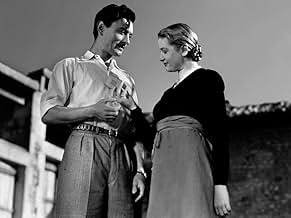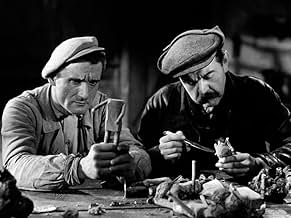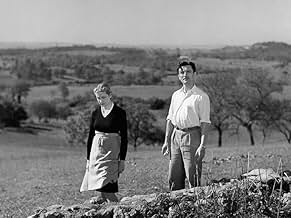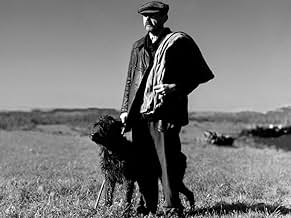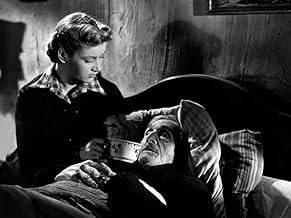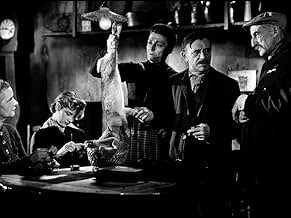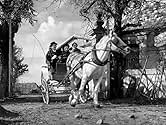IMDb-BEWERTUNG
7,5/10
1142
IHRE BEWERTUNG
Füge eine Handlung in deiner Sprache hinzuIn a lost French village, an old woman is killed and her savings stolen. Several members of her family, all called "Goupi", are suspected.In a lost French village, an old woman is killed and her savings stolen. Several members of her family, all called "Goupi", are suspected.In a lost French village, an old woman is killed and her savings stolen. Several members of her family, all called "Goupi", are suspected.
- Regie
- Drehbuch
- Hauptbesetzung
- Auszeichnungen
- 1 wins total
Albert Rémy
- Jean des Goupi
- (as Rémy)
Georges-François Frontec
- Bit Part
- (Nicht genannt)
Maurice Marceau
- Un porteur à la gare
- (Nicht genannt)
Empfohlene Bewertungen
For better or worse Jacques Becker is destined to be remembered - at least outside France - for Casque d'Or and whilst this is not bad as memorials go it's a pity that some of his other work such as Touchez pas au grisbi and this one are not better known and/or perhaps do not travel quite so well. Marcel Pagnol has a lot to answer for but not all of it is bad. He wrote the Book as far as French Provincials are concerned and if imitation really is the sincerest form of flattery then he will be a happy bunny and smiling down benignly on the likes of Les Enfants du Marais, etc. Of course in 1943 he could have looked Becker in the eye and laid a broad smile on him for he was still very much with us and it is interesting to speculate on what he would have made of this entry in which, in no particular order, Lust, Avarice and Murder, shuffle to center stage, take a bow and exit pursued by a cliche. Becker returned to the group-as-microcosm plot time and again and often - Touchez pas au grisbi, Casque d'Or, Le Trou - the group was the Underworld, but here it is our old friend the 'extended' family. Deep in Charente - though it could be anywhere where trees outnumber people -live the Clan Goupi, each one complete with his or her nickname and like families everywhere they have their own internicine digs. But what's a group situation without a catalyst so enter Eugene Goupi, fresh from Paris - his mother had fled the claustrophobic atmosphere when he was a mere tot so he has never seen his 'family - and enter Murder most foul and missing treasure and green-eyed monsters all contributing to a rich bouillabaise that stirs rather than shakes the viewer. Some sixty years later the actors, to a man, are virtually forgotten but they live on in this bizarrely-patterned yet ultimately warm patchwork quilt. 8/10
Who could have wanted to kill Tisane? The list of suspects is a long one. Marie and her son Jean had just been told that they would have to leave the house where they had been taken in "out of charity"; no love lost there. Mains-Rouges and Tonkin both had been the targets of Tisane's insults over the years, while Muguet had just been told that she must marry Monsieur, who has just arrived from Paris. The 10,000 francs that Tisane had hidden in the armoire are missing... The story as told by Pierre Véry and Jacques Becker is full of atmosphere and menace and has the cream of French actors of the time (those who hadn't left Vichy France for easier surroundings).
Fernand Ledoux is splendid as Mains-Rouges; he puts on a deadpan face in order to play detective--we are told that the Goupis have no need of the police, they solve all their problems in house. Robert Le Vigan is once more at the top of his game: Tonkin is so poetic and threatening, an unforgettable performance. Blanchette Brunoy gives an accomplished performance as Muguet, the girl who is not sure where her heart lies.
A film classic that is not available on DVD is an orphan. Will somebody give this deserving orphan a home?
Fernand Ledoux is splendid as Mains-Rouges; he puts on a deadpan face in order to play detective--we are told that the Goupis have no need of the police, they solve all their problems in house. Robert Le Vigan is once more at the top of his game: Tonkin is so poetic and threatening, an unforgettable performance. Blanchette Brunoy gives an accomplished performance as Muguet, the girl who is not sure where her heart lies.
A film classic that is not available on DVD is an orphan. Will somebody give this deserving orphan a home?
This is actually a very subversive film, given the circumstances and the date (1943) at which it was made. It is set in the Charente, which is a region a little to the east of La Rochelle, and not too far from the cities of Limoges and Poitiers. As such it was close (if not on) the border between the zone of (German) occupation and Vichy France. Although this film consists mostly of interiors there are enough outdoor scenes (all shot in what looks like late autumn or early winter) to give a real feel for the countryside.
Vichy (which had a reduced jurisdiction over occupied France) sunk a very large amount of political capital into the promotion of a 'certain idea of France' - that's De Gaulle's phrase, however, not Petain's). That 'idea' was of a rejuvenated nation, that case aside the infamous corruption of the Third Republic, and which gave pride of place to morality, (Roman Catholic) religion and country - specifically the countryside, rather than the cities (which were nests of subversives and Semites, so-called). It was a form of the 'integral nationalism' promoted by Charles Maurras, but with Petain as a substitute monarch.
However, here is a film which deliberately sets the city (in the person of the naive store clerk, Eugene, played by the young Georges Rollin) against his rather wicked rural relatives, complete with a tipsy, centenarian patriarch (Maurice Schultz). It turns into a rather interesting detective story, but one with a very literary style.
I imagine that it slipped through the censor's scissors only because of the portrayal of the Parisian Eugene as witless and rather feckless - almost a pawn in the hands of his unscrupulous uncles and cousins. Yet the film is much more savage towards the peasants, who are really a gallery of grotesques. They are superstitious, opportunistic, entirely selfish, idle and grasping - it is almost like one of Guy de Maupassant's caricatures of the narrow-minded and bigoted Norman farmers and petit-bourgeois. So the enormous propaganda push by Vichy to elevate 'la France profonde' to mystical status is here either ridiculed or simply disregarded. This is really a film about characterisation rather than plot, and the cast (led by the excellent Fernand Ledoux) are first rate.
It is a pity that Jacques Becker was not able to keep up the good work in the postwar years - films like "Ali Baba" (with Fernandel), "Montparnasse 19" and "Arsene Lupin" for the most part didn't measure up to "Goupi Mains Rouges" or "Casque d'Or". Perhaps it is true that the restraints of a repressive culture and regime do make for a better and more subtle product.
Vichy (which had a reduced jurisdiction over occupied France) sunk a very large amount of political capital into the promotion of a 'certain idea of France' - that's De Gaulle's phrase, however, not Petain's). That 'idea' was of a rejuvenated nation, that case aside the infamous corruption of the Third Republic, and which gave pride of place to morality, (Roman Catholic) religion and country - specifically the countryside, rather than the cities (which were nests of subversives and Semites, so-called). It was a form of the 'integral nationalism' promoted by Charles Maurras, but with Petain as a substitute monarch.
However, here is a film which deliberately sets the city (in the person of the naive store clerk, Eugene, played by the young Georges Rollin) against his rather wicked rural relatives, complete with a tipsy, centenarian patriarch (Maurice Schultz). It turns into a rather interesting detective story, but one with a very literary style.
I imagine that it slipped through the censor's scissors only because of the portrayal of the Parisian Eugene as witless and rather feckless - almost a pawn in the hands of his unscrupulous uncles and cousins. Yet the film is much more savage towards the peasants, who are really a gallery of grotesques. They are superstitious, opportunistic, entirely selfish, idle and grasping - it is almost like one of Guy de Maupassant's caricatures of the narrow-minded and bigoted Norman farmers and petit-bourgeois. So the enormous propaganda push by Vichy to elevate 'la France profonde' to mystical status is here either ridiculed or simply disregarded. This is really a film about characterisation rather than plot, and the cast (led by the excellent Fernand Ledoux) are first rate.
It is a pity that Jacques Becker was not able to keep up the good work in the postwar years - films like "Ali Baba" (with Fernandel), "Montparnasse 19" and "Arsene Lupin" for the most part didn't measure up to "Goupi Mains Rouges" or "Casque d'Or". Perhaps it is true that the restraints of a repressive culture and regime do make for a better and more subtle product.
Adapted by Pierre Véry from his own novel and directed by Jacques Becker this is a splendidly low key satire on rural life and a highly unflattering portrait of cunning Charentais peasants whose family name is Goupi and whose family values are based upon the making and hoarding of money.
Although verging on the caricature the performances are by a cast that is wonderfully 'true' and whose quality is one that it would be virtually impossible to replicate now, notably Fernand Ledoux as the title character, Arthur Dévere as Goupi-Mes sous and the infamous but brilliant Robert le Vigan as the deranged Goupi-Tonkin.
It is a mixture of murder mystery and black comedy and despite being gloriously subversive for its time, one can only assume that it was spared the same fate that befell the equally subversive 'Le Corbeau' by virtue of the final scene which artfully espouses the Pétainist values of 'Travail, Famille et Patrie'.
This is the third of Becker's thirteen films, the best of which are among the best that French Cinema has to offer and for what it's worth he became one of the few Old Guard directors to be given the seal of approval by the New Ripple brigade.
Although verging on the caricature the performances are by a cast that is wonderfully 'true' and whose quality is one that it would be virtually impossible to replicate now, notably Fernand Ledoux as the title character, Arthur Dévere as Goupi-Mes sous and the infamous but brilliant Robert le Vigan as the deranged Goupi-Tonkin.
It is a mixture of murder mystery and black comedy and despite being gloriously subversive for its time, one can only assume that it was spared the same fate that befell the equally subversive 'Le Corbeau' by virtue of the final scene which artfully espouses the Pétainist values of 'Travail, Famille et Patrie'.
This is the third of Becker's thirteen films, the best of which are among the best that French Cinema has to offer and for what it's worth he became one of the few Old Guard directors to be given the seal of approval by the New Ripple brigade.
27-year-old Georges Rollin get called back from Paris by his father to their farm/inn, none of which he has seen for 25 years. He doesn't know why, but it turns out his father wants to consolidate the fortune of both branches of the family by marrying him to his cousin Blanchette Brunoy, despite the fact she and another cousin, Robert Vignon are getting it on. On arrival, he's scared out of his wits by an uncle, discovers his great-grandfather's corpse, is accused of murdering an aunt and stealing the mysterious family fortune.
A typical French country family, you'd say, particularly if you're fond of TOBACCO ROAD. Every one of them has a nickname that everyone in the town knows about to exclusion of actually knowing their real names: Goupi Monsieur or Goupi Le Loi or Goupi Mains Gauches and they don't get along particularly well, but unite against outsiders. As the movie went along, it got darker and darker, and I thought director Jacques Becker had made a Clouzot-style picture. Was he trying to get himself banned, too?
Well, you'll have to see how it turns out. It's certainly entertaining, and familiar enough if you come from a large family.
A typical French country family, you'd say, particularly if you're fond of TOBACCO ROAD. Every one of them has a nickname that everyone in the town knows about to exclusion of actually knowing their real names: Goupi Monsieur or Goupi Le Loi or Goupi Mains Gauches and they don't get along particularly well, but unite against outsiders. As the movie went along, it got darker and darker, and I thought director Jacques Becker had made a Clouzot-style picture. Was he trying to get himself banned, too?
Well, you'll have to see how it turns out. It's certainly entertaining, and familiar enough if you come from a large family.
Wusstest du schon
- WissenswertesAward: Grand Prix du Cinéma Français 1943.
- VerbindungenFeatured in Voyage à travers le cinéma français (2016)
Top-Auswahl
Melde dich zum Bewerten an und greife auf die Watchlist für personalisierte Empfehlungen zu.
- How long is It Happened at the Inn?Powered by Alexa
Details
- Erscheinungsdatum
- Herkunftsland
- Sprache
- Auch bekannt als
- It Happened at the Inn
- Drehorte
- Charente, Frankreich(Exterior)
- Produktionsfirma
- Weitere beteiligte Unternehmen bei IMDbPro anzeigen
- Laufzeit
- 1 Std. 44 Min.(104 min)
- Farbe
- Seitenverhältnis
- 1.37 : 1
Zu dieser Seite beitragen
Bearbeitung vorschlagen oder fehlenden Inhalt hinzufügen

